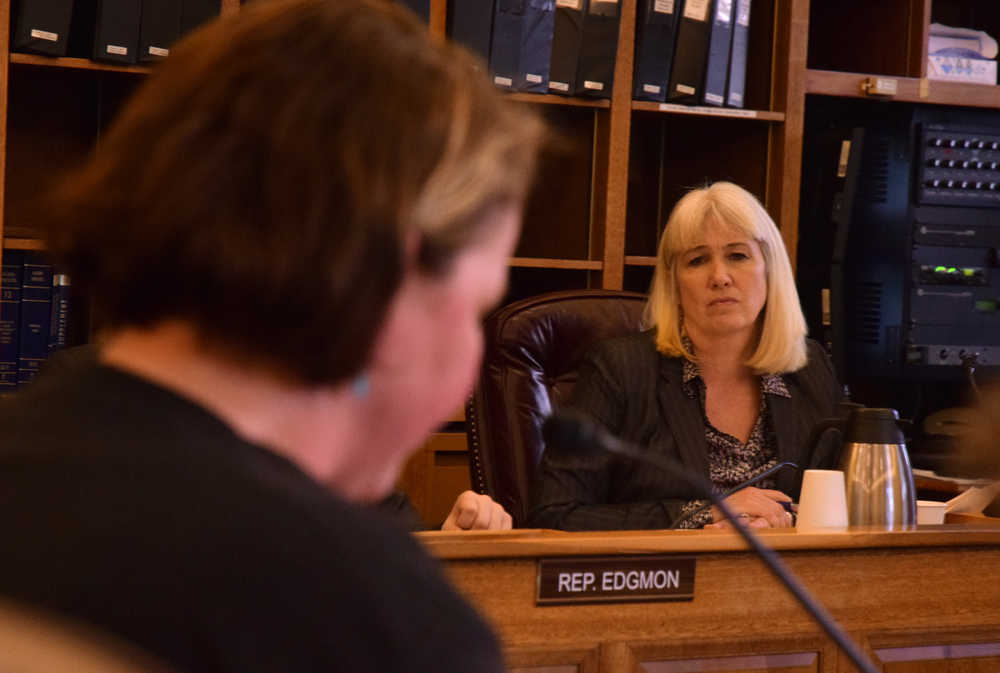To talk about a budget affecting every Alaskan, 53 Juneauites walked up to a microphone and shared their thoughts with the Alaska Legislature’s House Finance Committee.
This week, as the committee prepares to finalize the state’s operating budget for the coming fiscal year, it’s hearing from Alaskans in an extended series of public testimony opportunities.
Juneau got the first opportunity, with members of the committee listening for two hours Monday evening as, one by one, Juneau residents stood up, walked through an overflowing committee room, and spoke their minds.
“We know you have tough decisions to make, and ensuring that we support the right priorities is key,” said Abby Hensley, director of the Best Beginnings pre-kindergarten program, explaining the reason she was testifying.
While many people spoke out against cuts to state-funded pre-kindergarten programs, more people spoke up in support of funding for the state’s behavioral health programs. Those programs fund drug and alcohol abuse treatment and prevention.
William James Musser V told lawmakers that he’s a heroin addict in recovery, and he just wanted to show up and give his support for the programs that helped him.
“I’ve utilized those services to get clean and sober and stay clean and sober, and they have just been so vital,” he said.
After he finished, those in the committee room gave him a loud round of applause.
Michele Morgan, founder of Juneau Stop Heroin, Start Talking, said addiction is a critical issue in Alaska that affects every state resident directly or indirectly. If the state cuts treatment programs, there will be consequences, she warned.
“If we cut behavioral health services … we are creating somewhat of a perfect storm of crime,” she said. “I know the budget is No. 1, but if we let the drug epidemic continue, the toll on our state and its citizens will be immense.”
Catholic deacon Charles Rohrbacher reminded lawmakers that he stood with many of them in an anti-abortion, “pro-life” rally in January. Funding behavioral health programs is also a pro-life decision, he said.
“The ethical and moral measure of any society … is demonstrated by the care and compassion we have for the poor,” he said. “I urge you to fully fund behavioral health … I urge you to choose life.”
While education and behavioral health were the top issues raised Monday evening, there were occasional variations from the chorus of support for those programs.
Richard Cole, owner of Fjord Flying Service and a member of the KTOO public broadcasting board of directors, urged lawmakers to avoid cuts to the state’s public broadcasting subsidy.
“In my experience … I have benefited from the connectivity that public radio does provide for us as a community,” he said.
With the cuts the Legislature is proposing, some rural public radio stations will have to shut down.
Cole explained that as the owner of a small airline, public radio is important. When an accident happened last year, he said, “public media was the way for people to be informed about where their loved ones were.”
A handful of speakers spoke up in favor of the University of Alaska’s extension service, which supports 4-H programs and education regarding home-grown food.
Another handful simply offered their general advice to the Legislature. Mary Hakata told legislators that her family relies on commercial fishing, which is subject to price fluctuations just like crude oil.
When prices dropped, they cut their family budget, but “we also immediately went out and sought new revenue measures.”
“Do what you have to do; reinstate an income tax, give every Alaskan skin in the game,” she said. “Please do what you have to do and keep the importance of kids … front and foremost.”
• Contact reporter James Brooks at james.k.brooks@juneauempire.com.

